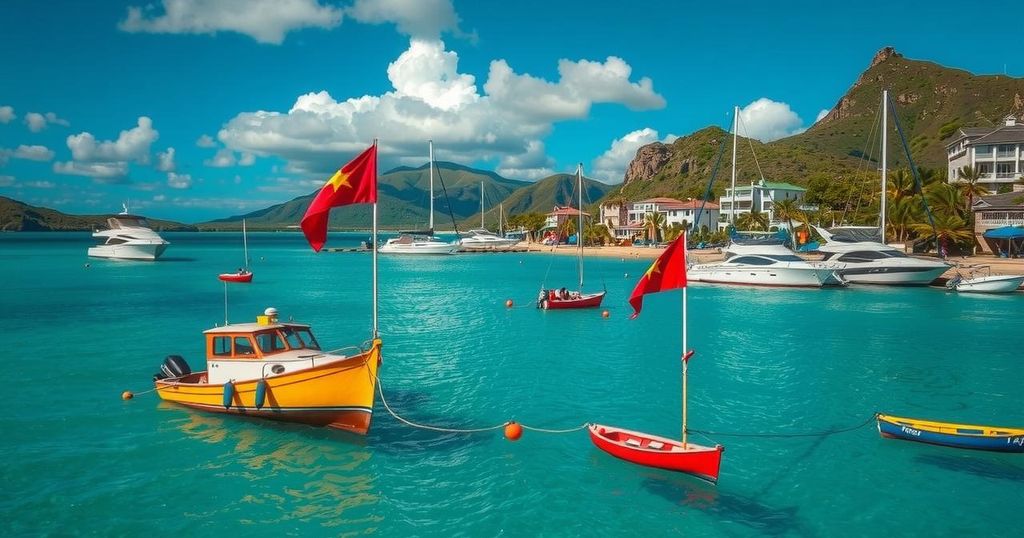Mauritius held parliamentary elections amid a cost of living crisis, with Prime Minister Pravind Kumar Jugnauth and his rivals promising economic reforms. Polling began at 7 a.m. local time, and voters are dissatisfied with projected economic growth. The ruling coalition pledges wage increases and lower taxes, while the opposition promises similar benefits. The outcome will shape the nation’s economic future significantly.
On Sunday, Mauritius conducted its parliamentary elections, with economic concerns, particularly regarding the cost of living, as a central theme among voters. Prime Minister Pravind Kumar Jugnauth, leading the Alliance Lepep coalition, along with his main competitors, asserted their commitment to addressing this crisis. Polling commenced at 7 a.m. local time, seeing modest voter engagement prior to the conclusion of voting scheduled for 2 p.m. Home to approximately 1.3 million people, Mauritius presents itself as a crucial nexus between Africa and Asia. The nation’s economic model relies heavily on its robust offshore financial sector, tourism, and textile industries. Despite an anticipated economic growth rate of 6.5 percent for the current year—slightly down from 7.0 percent the previous year—many citizens express dissatisfaction with their financial circumstances. The Alliance Lepep coalition has vowed to raise the minimum wage, enhance pensions, and lower value-added tax on essential goods. The coalition also plans to utilize financial compensation from the UK, tied to the recent agreement concerning the Chagos Islands, which also secures the US-UK air base at Diego Garcia. Additionally, Mauritius benefits from aid provided by China. Political analyst Subash Gobine articulated that, “The alliance led by the prime minister is selling the economic prosperity card, with promises of more money to different segments of the population.” In parallel, the opposition coalition, primarily the Alliance du Changement under Navin Ramgoolam’s leadership, advocates for similar provisions, such as pension increases and the introduction of free transportation and internet services. Clarity in voter sentiment is pronounced, especially among the youth, as noted by 36-year-old Port Louis resident David Stafford, who remarked, “It is the youths who will make the difference in these elections.” This demographic is particularly attuned to desires for economic innovation and job creation, alongside fiscal reforms. A voter turnout of slightly over a million individuals is projected to fill the 62 parliamentary seats from a selection of 68 parties and five political alliances. Notably, the Jugnauth government imposed a temporary ban on social media preceding the election, citing security reasons after sensitive discussions were leaked. The prohibition was lifted shortly after criticism arose from opposition factions. In the parliamentary elections, victory will be awarded to whichever party or coalition secures a majority of over half the available seats, thereby winning the prime ministerial position.
Mauritius is currently experiencing a significant cost of living crisis, affecting its citizens’ standard of living despite projected economic growth. The upcoming elections are seen as a pivotal moment for the ruling party and opposition, both promising robust measures to alleviate economic pressures. The recent geopolitical developments regarding the Chagos Islands and continued international aid, particularly from Britain and China, are also influencing the political landscape, drawing substantial attention from the electorate. As the nation prepares to cast its votes, the challenges of rising living costs, youth engagement, and the ongoing ramifications of governmental policies are at the forefront of the electorate’s concerns. This election is pivotal in shaping future economic policies and determining leadership direction in Mauritius.
In conclusion, the parliamentary elections in Mauritius are crucial as they emerge amidst pressing economic challenges, particularly the escalating cost of living. Prime Minister Pravind Kumar Jugnauth and his main rivals have placed economic policies at the forefront of their campaigns, promising to improve citizens’ financial realities. The election results will significantly influence the island nation’s trajectory over the next five years, shaping economic strategies and addressing the evolving needs of its populace. Voter engagement, particularly among the youth, will play a critical role in determining the election’s outcome.
Original Source: www.arabnews.com






